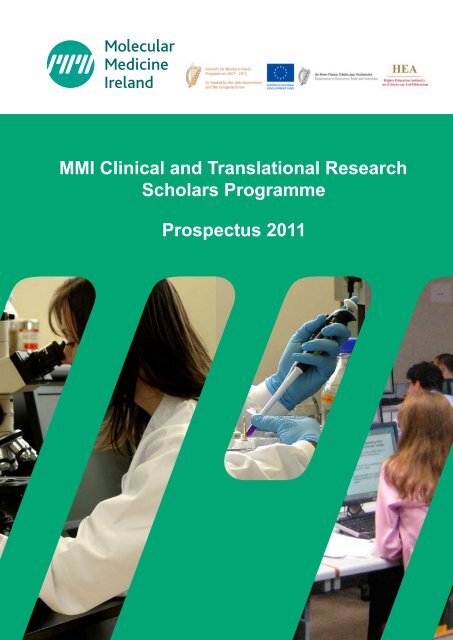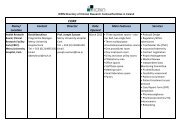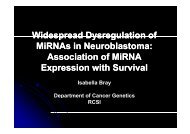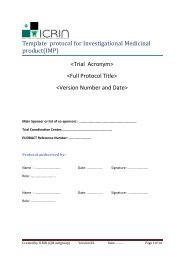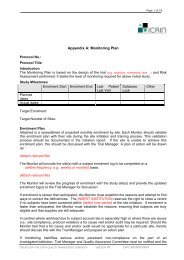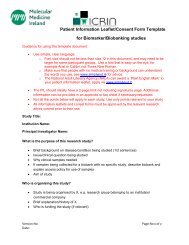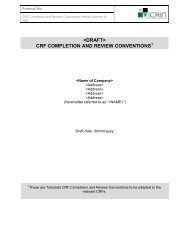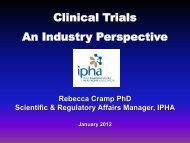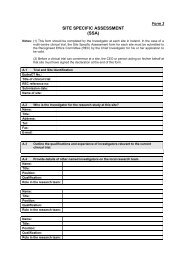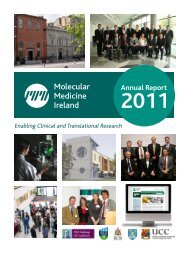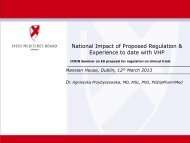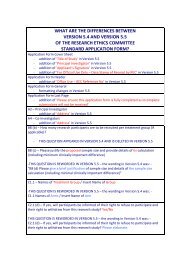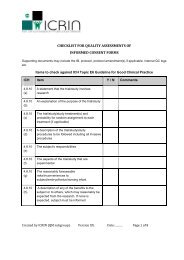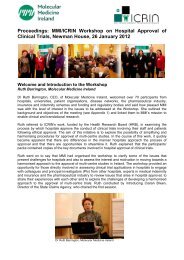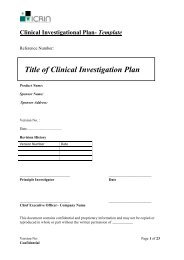MMI Clinical and Translational Research Scholars Programme ...
MMI Clinical and Translational Research Scholars Programme ...
MMI Clinical and Translational Research Scholars Programme ...
- No tags were found...
Create successful ePaper yourself
Turn your PDF publications into a flip-book with our unique Google optimized e-Paper software.
• <strong>Research</strong> with human subjects or onmaterial of human origin such as tissues,specimens <strong>and</strong> cognitive phenomena in the<strong>Clinical</strong> <strong>Research</strong> Facilities with supportfrom translational research laboratories.Please refer to page 7-11 for a list of potentialresearch project supervisors, together with detailsof their research interests.Structure of the CTRSPPlease refer to the CTRSP timeline on page 6.Year 1 of the 4-year programme includes core <strong>and</strong>optional graduate education modules delivered inDublin, Cork <strong>and</strong> Galway. These modules providea grounding in essential research skills <strong>and</strong>transferable skills together with access to specialisttopics.Year 1 also features practical placements in industry,in academic research laboratories <strong>and</strong> in clinicalresearch facilities.Towards the end of the first year, <strong>MMI</strong> <strong>Clinical</strong> &<strong>Translational</strong> <strong>Research</strong> <strong>Scholars</strong> will select theirPhD projects in areas including drug discovery,discovery/validation of biomarkers <strong>and</strong> patientorientedresearch in clinical research facilities.Please refer to page 7-11 for a list of potentialresearch project supervisors, together with detailsof their research interests.In years 2 <strong>and</strong> 3, work on PhD research projectsis supplemented with access to online graduateeducation modules with a strong innovation <strong>and</strong>commercialisation focus. Annual Scientific Meetingsprovide a forum for scholars to interact further <strong>and</strong>present their research.Graduate Education ModulesIn Year 1, the <strong>MMI</strong> <strong>Clinical</strong> & <strong>Translational</strong> <strong>Research</strong><strong>Scholars</strong> will participate in core modules at UCD<strong>and</strong> TCD <strong>and</strong> optional specialist modules in UCC<strong>and</strong> NUI Galway.Core Module topics include:• Disease Pathogenesis <strong>and</strong> the <strong>Translational</strong>Pathway.• Molecular Medicine.• Communication, Teamwork <strong>and</strong> <strong>Research</strong>Ethics.• Advanced Imaging.• <strong>Clinical</strong> Pharmacology.• Biostatistics.Optional Specialist Module topics include:• Early phase oncology.• Early phase clinical development.• Making clinical research change practice.• Stem cells <strong>and</strong> gene therapy.• Drug development <strong>and</strong> <strong>Clinical</strong> TrialsDesign.• Biomarker discovery in practice.• Neonatal brain injury.• Cardiovascular Biology.• Gastrointestinal Health.In Years 2 & 3 <strong>Scholars</strong> will complete distancelearning based modules.Module topics include:• IP <strong>and</strong> Technology Transfer.• Project Management.• Epidemiology.• Regulation Procedures.• <strong>Clinical</strong> <strong>Research</strong> Questions.• Case Studies in <strong>Research</strong> Ethics.• Case studies in Drug Development.• Case Studies in Biomedical DeviceDevelopment.PlacementsDuring Year 1, <strong>MMI</strong> <strong>Clinical</strong> & <strong>Translational</strong> <strong>Research</strong><strong>Scholars</strong> will undertake placements in academicresearch groups, in clinical research facilities, <strong>and</strong>in industry. Placements are designed to familiarise<strong>Scholars</strong> with the different research environments,build links with other researchers, <strong>and</strong> enable thecompletion <strong>and</strong> reporting of concise researchprojects with the support of mentors. In addition tothe CTRSP academic partners, industry partnersinclude Amgen, Creganna-Tactx Medical, MerrionPharmaceuticals, Medtronic, Opsona, <strong>and</strong> Pfizer.<strong>Research</strong> CentresNUI GalwayNational Centre for Biomedical Engineering Science(NCBES)The NCBES at NUI Galway is an interdisciplinarycentre which brings together scientists, engineers,information technologists <strong>and</strong> clinicians in a teambased,problem-centred approach to research.The Centre’s research is focused on innovativetherapeutic solutions to current medical challengesincluding cardiovascular disease, orthopaedics,reproductive medicine <strong>and</strong> cancer.3
Regenerative Medicine InstituteThe Regenerative Medicine Institute (REMEDI) wasestablished at NUI Galway in 2004 as a ScienceFoundation Irel<strong>and</strong> funded Centre for Science,Engineering <strong>and</strong> Technology with a central focuson the development of novel therapies for treatingmajor human diseases involving adult stem celltherapy <strong>and</strong> gene therapy.NUI Galway <strong>Clinical</strong> <strong>Research</strong> FacilityThe NUI Galway <strong>Clinical</strong> <strong>Research</strong> Facility, fundedby the Health <strong>Research</strong> Board <strong>and</strong> the HealthService Executive, opened in 2008. A new purposebuiltfacility is due to open on the campus ofUniversity Hospital Galway. This joint clinical <strong>and</strong>translational research centre will comprise state-ofthe-artfacilities for patient-based research <strong>and</strong> forthe processing <strong>and</strong> analysis of biological specimenssuch as blood samples from those patients.Trinity College DublinInstitute of Molecular MedicineThe Institute of Molecular Medicine (IMM) wasestablished in 2003 as a state-of-the-art facilitywithin the Trinity Centre for Health Sciences atSt James’s Hospital. The IMM is dedicated toresearch into the molecular basis of human diseasewith significant core technology platforms in HighContent Screening Analysis, Cell Signalling, HighThroughput Genomics, <strong>and</strong> Transcriptomics. Keyresearch themes are Infection & Immunity, Cancer<strong>and</strong> Neurosciences.University College CorkUCC BioSciences InstituteBasic <strong>and</strong> translational research at UCC havebeen greatly enhanced by the opening, in 2002,of the Biosciences Institute (BSI). The Instituteincorporates six major research programmes:Neuroscience, Cancer Biology, Cell Signalling <strong>and</strong>Cardiovascular Health, Plant Biotechnology <strong>and</strong>Integrative Genomics, Food for Health <strong>and</strong> MicrobeHost Interaction.UCC <strong>Clinical</strong> <strong>Research</strong> FacilityA <strong>Clinical</strong> <strong>Research</strong> Facility funded by the HRB, HSE<strong>and</strong> UCC is being established at Cork UniversityHospital (children) <strong>and</strong> at the Mercy UniversityHospital (adults). The <strong>Clinical</strong> <strong>Research</strong> Facility willfacilitate the development of exciting new strategiesin partnership with UCC <strong>and</strong> affiliated hospitals <strong>and</strong>with food <strong>and</strong> pharmaceutical industries to producenew treatments for patients across a large range ofclinical disorders.University College DublinDublin Academic Medical Centre (DAMC)UCD <strong>Clinical</strong> <strong>and</strong> <strong>Translational</strong> <strong>Research</strong> spansfrom, The Conway Institute of Biomolecular<strong>and</strong> Biomedical <strong>Research</strong> at Belfield across theDAMC, including St. Vincent’s University Hospital(SVUH) <strong>and</strong> The Mater Misericordiae UniversityHospital (MMUH). The integrated facilities featurea multidisciplinary Biomedical research Institutewith over 550 active research staff from across theuniversity <strong>and</strong> its associated teaching hospitals. TheUCD <strong>Clinical</strong> <strong>Research</strong> Centre (CRC) is located atthe two University Hospital sites SVUH <strong>and</strong> MMUHin purpose-built facilities supporting principalinvestigators involved in investigator-lead clinicaltrials, industry-sponsored studies <strong>and</strong> providesresearchers with research nursing services, datamanagement <strong>and</strong> biobanking facilities. The majorfocus of translational biomedical research at UCDincludes Inflammation, Infection, Immunity & Repair,Diabetes & Vascular Biology <strong>and</strong> Neuroscience.Dublin Centre for <strong>Clinical</strong> <strong>Research</strong> (DCCR)The DCCR, funded by the HRB <strong>and</strong> Wellcome Trust,will provide the infrastructure – the physical space,facilities <strong>and</strong> trained staff – needed to supportcollaborative clinical research studies across Dublin.As well as building a new <strong>Clinical</strong> <strong>Research</strong> Centreat St James’s Hospital, the DCCR is networking theresearch activities taking place at the RCSI <strong>Clinical</strong><strong>Research</strong> Centre at Beaumont Hospital <strong>and</strong> theUCD CRC at Mater Misericordae University Hospital<strong>and</strong> St. Vincent’s University Hospital into a facilityfor multi-centre clinical studies.CTRSP Application ProcedureTwenty scholarships are available in the first year ofthis prestigious national programme coordinated byMolecular Medicine Irel<strong>and</strong>. <strong>Scholars</strong> will be basedin one of the participating academic institutions:NUI Galway, TCD, UCC <strong>and</strong> UCD. Applicants arerequested to indicate their preferred host institutionin the application form.<strong>Scholars</strong>hips include a stipend of €16,000 perannum for four years <strong>and</strong> an allowance for research<strong>and</strong> travel expenses. Fees for EU students areincluded.High-calibre c<strong>and</strong>idates holding, or expecting toreceive, a first-class or upper second-class honoursdegree in an appropriate discipline are encouragedto apply.Further details <strong>and</strong> application form are available at:www.molecularmedicineirel<strong>and</strong>.ie/ctrsp5
<strong>MMI</strong> <strong>Clinical</strong> & <strong>Translational</strong> <strong>Research</strong> <strong>Scholars</strong> <strong>Programme</strong>TimelinePhD completedSelect PhDprojectCore ModulesAcademic Lab,Industry <strong>and</strong> <strong>Clinical</strong><strong>Research</strong> FacilityPlacementsAnnual ScientificMeetingAnnual ScientificMeetingOnline ModulesAnnual ScientificMeetingAnnual ScientificMeetingSpecialist ModulesPhD projectOctober2011Year 1October2012Year 2October2013Year 3October2014Year 46
CTRSP Investigators <strong>and</strong> <strong>Research</strong> ProjectsPotential research project supervisors in NUI Galway, Trinity College Dublin, University CollegeCork <strong>and</strong> University College Dublin are listed here with details of their research interests. Thislist is intended to give c<strong>and</strong>idates examples of the areas of research that will be available to <strong>MMI</strong><strong>Scholars</strong> during laboratory rotations in Year 1 <strong>and</strong> when the PhD project is selected towards theend of Year 1. Please note that Principal Investigators <strong>and</strong> areas of research listed here are forguidance. Some projects listed here may not be available <strong>and</strong> others may be included at the timeof project selection.NUI GalwayPrincipal InvestigatorProf Laurence EganProf Frank BarryProf Martin CormicanProf Fidelma DunneProf Matt GriffinProf Michael KerinProf John LaffeyProf Andrew MurphyProf Tim O’BrienDr Eilis DowdProf Michael O’Dwyer<strong>Research</strong> InterestsMolecular mechanisms of intestinal injury, repair <strong>and</strong> carcinogenesis; focus on biologicalfunctions of transcription factor NF-kappaB; identification <strong>and</strong> characterization of noveltherapeutic targets for inflammatory bowel disease, colon cancer <strong>and</strong> radiation injury to theintestinal tract; <strong>Clinical</strong> <strong>Research</strong>.Isolation, characterization <strong>and</strong> therapeutic application of adult stem cells from bone marrow;cardiovascular <strong>and</strong> arthritic diseases; use of Mesenchymal Stem Cells for the delivery ofspecific therapeutic genes; proteomics <strong>and</strong> mass spectrometry for the identification of surfacemolecules on cells.<strong>Clinical</strong> Microbiology; prevention, diagnosis <strong>and</strong> management of infectious disease; MRSA;antibiotic resistance; Salmonella Reference Laboratory.Endocrinology; pregnancy <strong>and</strong> diabetes; ATLANTIC DIP programme which is a prospectivestudy to examine the outcome of pregnancy in diabetic women.Immunology of Acute Kidney Injury; Immunological Properties of Mesenchymal Stem Cells;Immunomodulatory Effects of Vitamin D; Pathogenesis of Kidney Transplant Fibrosis; <strong>Clinical</strong>Outcomes of Kidney Transplantation; Polyomavirus-associated Nephropathy.Gene Expression Profiling investigating the metastatic potential of early breast cancerusing a combined gene expression microarray <strong>and</strong> real-time quantitative PCR approach;Gene Therapy investigating the potential of human Mesenchymal Stem Cells as vectors fortherapeutic gene delivery to breast tumours; Population Genetics to identify common genesthat predispose to breast cancer.Hypercapnic acidosis; gene <strong>and</strong> stem cell therapies in the setting of Acute Respiratory DistressSyndrome; effects of sepsis on myocardial performance <strong>and</strong> on mitochondrial bioenergetics,effects of volatile anaesthetic agents <strong>and</strong> of sidlenafil in the Foeto-Placental Circulation;provision of effective analgesia for acute pain.General Practice; chronic disease management <strong>and</strong> professional practice in the community;Ambulatory Blood Pressure Monitoring, Secondary Prevention of Heart Disease in GeneralPractice; antibiotic resistance.REMEDI; gene delivery <strong>and</strong> stem cell biology to promote organ regeneration <strong>and</strong> repair;ischaemic cardiovascular disease <strong>and</strong> osteoarthritis; targeted expression of nitric oxide geneisoforms in the diseased vessel site <strong>and</strong> the use of endothelial progenitor cells as a genedelivery system; pathogenesis of diabetic vascular disease including the role of endothelialprogenitor cell dysfunction.The development <strong>and</strong> validation of novel cell <strong>and</strong> gene therapies for Parkinson’s disease;using viruses to deliver therapeutic gene products to the brain; transplantation of dopaminergicneurons derived from human embryos, xenodonors or stem cells.Development of new therapeutic approaches for the treatment of leukaemia <strong>and</strong> multiplemyeloma; Cdc7 inhibition in chronic lymphocytic leukaemia (CLL) <strong>and</strong> myeloma; BH3 mimetics<strong>and</strong> TRAIL as apoptosis inducing agents in leukaemia; clinical trials <strong>and</strong> translation.7
Dr Fabio QuondamatteoProf Lokesh JoshiDr Karl McCullaghDr Francis FinucaneProf Rob WoodsProf Richard FlavinDr Howard FearnheadDr Thomas KropmansProf Peter DockeryDr John LynchDr Faisal SharifProf Corrado SantocanaleDr Mary MurphyDr Leo KevinDr Paul DonnellanProf John MorrisonProf Frank GilesDr Malini OlivoDr Mark da CostaStudy of the cell biological role of basement membrane <strong>and</strong> extracellular matrix componentsin vivo; Glycoscience; Cell biological aspects of normal <strong>and</strong> pathological development; <strong>Clinical</strong>Anatomy; development of therapeutic devices for neuromuscular stimulations.Glycosciences <strong>and</strong> Bioengineering to discover <strong>and</strong> develop novel molecules, processes<strong>and</strong> biomaterials <strong>and</strong> relevant technologies for biotherapeutic <strong>and</strong> biodiagnostic purposes;Post-translational modifications <strong>and</strong> recombinant protein engineering; protein <strong>and</strong> peptidetherapeutics; glycosensors, glycosignatures, <strong>and</strong> glycomimetics.Muscular Dystrophy; Proteins associated with the dystrophin protein complex; Cell signalling<strong>and</strong> regulation of skeletal muscle fibre types; Growth <strong>and</strong> regeneration of muscle.Endocrinology; Obesity; Bariatric Medicine; Diabetes.Relationships between the conformations of carbohydrate molecules <strong>and</strong> biologicalrecognition <strong>and</strong> activity, particularly the mechanisms involved in carbohydrate recognitionin immunological events; computational techniques of molecular dynamics <strong>and</strong> free energyperturbation simulations; examinations of bacterial antigen-antibody interactions, as well ascarbohydrate-lectin interactions.Molecular mechanisms of breast cancer; breast cancer progression <strong>and</strong> heterogeneity;evaluation of different stages of the disease from early precursor lesions through in situtumours to invasive disease <strong>and</strong> metastasis.Biochemical <strong>and</strong> molecular basis of apoptotic cell death; Neurological Disorders, CardiovascularDisease, <strong>and</strong> Cancer with the aim of developing new therapies for these diseases.Postgraduate medical education <strong>and</strong> continuing professional development; application ofinformation <strong>and</strong> communication technologies to support evidence practice in both hospital<strong>and</strong> community based health care.Neurobiology; Cellular interactions in the developing <strong>and</strong> ageing nervous system; Development<strong>and</strong> repair of the Spinal Cord; Human Reproduction; Structure-Function of the HumanEndometrium; Cellular effects of endocrine disrupting chemicals on reproductive tissues;Feto-maternal interface.Genetics of epilepsy predisposition; pharmacogenetics of anti-epileptic drug response;genetics of Parkinson’s disease; psychosocial impact of epilepsy.Vascular biology <strong>and</strong> Gene Eluting Stents; translational medicine focusing on cardiovascularclinical trials for medical devices <strong>and</strong> basic science outputs; myocardial regeneration.DNA replication <strong>and</strong> cell cycle progression; developing novel therapeutic strategies <strong>and</strong>molecular biomarkers to follow drug action in cancer patients; molecular characterization ofCdc7 kinase <strong>and</strong> of its substrates <strong>and</strong> defining the mechanism of action of emerging Cdc7inhibitors.Adult stem cells for tissue regeneration in cartilage repair <strong>and</strong> osteoarthritis; Biology of vascularderived stem cells in atherosclerosis; Cardiomyogenic differentiation of adult stem cells; Effectof electroactive particles.Effects of sepsis on myocardial performance <strong>and</strong> on mitochondrial bioenergetics, volatileanaesthetic agents <strong>and</strong> sidlenafil in the Foeto-Placental Circulation.Medical Oncology; Extensive-Stage Small Cell Lung Cancer; <strong>Clinical</strong> Trials; national breastcancer trials; radiation oncology.Myometrial physiology; Pre-term labour; Pre-natal diagnosis <strong>and</strong> high-risk obstetrics; volatileanaesthetic agents in the Foeto-Placental Circulation.<strong>Clinical</strong> <strong>Research</strong>; therapy for patients suffering from treatment-resistant or refractory cancer;development of novel drugs, immunotherapies, <strong>and</strong> other highly targeted approaches,including cancer-directed viruses.Molecular Imaging <strong>and</strong> Photomedicine; nano-biophotonics science for biomedical diagnostics<strong>and</strong> therapeutics; early detection of cancer using novel minimally invasive endoscopic opticaltechniques <strong>and</strong> for the treatment of cancer using light activation of drugs that target cancer.Cardiothoracic Surgery.8
Prof Colm McDonaldDr David FinnProf Anthony WheatleyDr Donald BlackProf W.J.M. van der PuttenDr Kilian WalshDr Donal ReddanDr John Kelly<strong>Clinical</strong> research in psychiatry; Aetiopathogenesis of psychotic illness; Mapping of brainabnormalities associated with psychotic <strong>and</strong> affective disorders; The relationship of such brainabnormalities to genetic <strong>and</strong> environmental risk factors; effect of psychotropic medications;Endophenotypic markers of schizophrenia <strong>and</strong> bipolar disorder; Neurobiological abnormalitiesassociated with psychotic <strong>and</strong> affective disorders.Neurochemical, neuroendocrine <strong>and</strong> molecular mechanisms underlying pain, anxiety <strong>and</strong>depression. Neuropharmacology of cannabinoid <strong>and</strong> opioid receptors. Imidazoline bindingsites, brain monoamines <strong>and</strong> the stress response. Neuroimmune mechanisms of relevance topain, inflammation <strong>and</strong> mood disorders.Control of preimplantation embryo growth <strong>and</strong> development; Mechanisms regulatingovulation; Signalling systems involved in the control of cell differentiation; Neuropharmacology<strong>and</strong> neurotoxicology of the polyamines; pathophysiology of stroke <strong>and</strong> Parkinson’s disease;neurodevelopment in vitro models.<strong>Clinical</strong> <strong>Research</strong>; Trialynx, Inc.; cardiovascular disease including atherosclerosis <strong>and</strong>dyslipidemia; Medical diagnostics; Molecular imaging; Pediatrics.General Application of Physics <strong>and</strong> Technology in Medicine; Radiobiological modelling ofradiotherapy; Optimisation in Diagnostic Radiology; Risk <strong>and</strong> Safety with medical devices.Urology; prostate <strong>and</strong> kidney cancer.Chronic Kidney Disease <strong>and</strong> Cardiovascular risk; Contrast induced acute Kidney Injury;Anemia of Chronic Kidney Disease.Investigation of the mechanism of action of antidepressants <strong>and</strong> the development of noveltargets using animal models; the effects of antidepressants on modulating immune responses;development of nonanimal alternatives for toxicological assessment of drugs.Trinity College DublinPrincipal InvestigatorProf Dermot KelleherProf Padraic FallonProf Joseph KeaneDr Aideen LongDr Aiden CorvinProf Thomas FrodlProf Michael GillProf Alan IrvineDr Ross McManus<strong>Research</strong> InterestsDevelopment of novel therapeutics for oesophageal cancer; the biology of the gastrointestinalimmune system.Immunological mechanisms of suppression of inflammatory diseases; study of genetic versusenvironmental predisposition to inflammatory disease; use of mouse transgenics to dissectimmune function.Translating improved underst<strong>and</strong>ing of pulmonary immunology into new treatments, tests <strong>and</strong>vaccines for tuberculosis. Cellular <strong>and</strong> clinical immunology.Molecular mechanisms of the inflammatory response: T lymphocyte migration – protein KinaseC (PKC): cytoskeletal interactions; genome-wide siRNA screen of T lymphocyte migration;effect of bile acids on PKC signalling in colonic <strong>and</strong> oesophageal cells.Genomics of psychosis, psychiatric disorders <strong>and</strong> cognition; targeting molecular mechanismsfor therapeutics in psychiatry/cognition.Neuroimaging: investigation of mood disorders, dementia, <strong>and</strong> schizophrenia with functional<strong>and</strong> structural imaging techniques; use of imaging to identify markers for the prediction oftreatment response <strong>and</strong> for therapy success; genetic effects on function <strong>and</strong> structure inimaging; neurobiological underpinnings of psychiatric diseases.Relationships between phenotype <strong>and</strong> genotype in three key neuropsychiatric disorders:Psychoses, Autism <strong>and</strong> ADHD; gene hunting, functional genomics; translation of geneticfindings into clinical relevance; underst<strong>and</strong>ing gene function as a prelude to new treatments.Genetic <strong>and</strong> clinical studies on eczema <strong>and</strong> atopic dermatitis.Genomics of coeliac disease; gene expression in sepsis; genomics of inflammatory boweldisease.9
Dr Joe MeaneyProf John O’LearyProf Yuri VolkovProf John ReynoldsHigh resolution whole body structural imaging for cardiovascular disease <strong>and</strong> cancer; functionalimaging of tumours with high-resolution 3T MRI compared to PET-CT scanning; imaging ofatherosclerosis with high-resolution 3T MRI.Cancer stem cell biology; tumour transcriptomics; miRNA / naturally occurring anti-sensemolecules.Biomedical applications of nanotechnologies; cell adhesion <strong>and</strong> migration in inflammation <strong>and</strong>cancer; intracellular signalling <strong>and</strong> cytoskeletal dynamics; live cell <strong>and</strong> molecular imaging.Upper gastrointestinal cancer surgery: molecular predictors of sensitivity <strong>and</strong> resistance toneoadjuvant chemoradiotherapy in oesophageal adenocarcinoma; gastrointestinal mucosalimmunology; cellular <strong>and</strong> molecular studies in Barrett’s oesophagus.University College CorkPrincipal InvestigatorProf. David KerinsProf. Noel CapliceDr John CryanProf. Timothy DinanDr Liam FanningProf. Gerald Fitzgerald / Dr PaulO’TooleProf. Jonathan HourihaneProf. Edward JohnsProf. Louise KennyProf. Rosemary O’ConnorProf. Gerry O’SullivanProf. Ivan PerryProf. Eamonn QuigleyDr Anne Moore / Dr ConorO’MahonyDr Declan SodenProf Helen Whelton / Dr Cian ÓMathúnaDr Geraldine Boylan Dr DeirdreMurray / Prof Louise KennyDr Deirdre Murray / Dr MaireadKiely<strong>Research</strong> InterestsPlatelet function <strong>and</strong> vascular diseaseStem cells <strong>and</strong> cardiovascular diseaseMolecular basis of stress induced effects on the brainStress biology, neuro gastroenterologyMolecular diversity of Hepatitis C, Human Immunodeficiency Virus <strong>and</strong> Hepatitis B Viruse<strong>and</strong> how this impacts on disease outcomeComponents of the human gut microbiota <strong>and</strong> their contribution to intestinal healthThe effect of antenatal <strong>and</strong> post natal body composition on metabolic status <strong>and</strong> metabolicrisk factors in children aged 2 <strong>and</strong> 5 years oldNeuro-humoral control of the kidney <strong>and</strong> the impact on blood pressure controlUse of metabolomic technology to search <strong>and</strong> validate early pregnancy biomarkers ofadverse pregnancy outcome; Vascular physiology/biology based programme usinga variety of animal models <strong>and</strong> ex vivo human tissue to search <strong>and</strong> characterise noveltherapeutic targets for preeclampsiaUnderst<strong>and</strong>ing <strong>and</strong> overcoming resistance to therapies that target tyrosine kinasepathways in cancerCancer researchMetabolism <strong>and</strong> disease with a focus on CVD <strong>and</strong> Diabetes including biomarkers of lipidmetabolism <strong>and</strong> inflammationHost-microbiota interactions in gastrointestinal disorders.The application of Micro needles in diagnostics, therapeutics <strong>and</strong> vaccinesCancer Gene Therapy for Lung CancerDevelopment of in-situ models for clinical testing of innovations in oral health careproducts. Collaboration with the Microelectronics Applications Integration Group, TyndallNational InstituteValidation of early placental <strong>and</strong> serum biomarkers in neonatal brain injury.Cardio-metabolic phenotyping in toddlers: body composition <strong>and</strong> metabolic profiles at 2years.10
University College DublinPrincipal InvestigatorProf Dolores Cahill<strong>Research</strong> InterestsBiomarker Discovery <strong>and</strong> Validation/Qualification, Development of Diagnostic Assays; Technologydevelopments towards improved interaction screening, e.g. nanoparticles, proteins, etc.Dr Paul CrosseyThe role of insulin-like growth factors <strong>and</strong> their binding proteins in disorders of growth <strong>and</strong> metabolism.Prof Catherine GodsonProf Pat GuiryProf Michael KeaneProf Ulla KnausDr Patrick MallonProf Ken McDonaldProf Paul Mc LoughlinDr Louise RainfordProf Kieran SheahanDr Albert SmolenskiProf Douglas VealeProf R William WatsonNovel mediators of inflammation <strong>and</strong> repair in diabetic complications.Synthetic chemistry; asymmetric catalysis, medicinal chemistry, total synthesis, natural productisolation, purification <strong>and</strong> biological evaluation.Vascular remodeling - mesenchymal <strong>and</strong> progenitor cells in lung injury.Innate <strong>and</strong> mucosal immunity; Regulation of inflammation activation; Novel NADPH oxidases inhealth <strong>and</strong> disease.HIV <strong>and</strong> bone mineral density, anti-retroviral adipose tissue toxicity.Active clinical programme in area of ventricular dysfunction (4000 patient data base) with linkedlaboratory work investigating mechanisms, markers <strong>and</strong> possible novel therapeutic approaches toventricular dysfunction.Hypoxia-mediated inflammation, pulmonary hypertension <strong>and</strong> vascular remodelling.Dose Investigation <strong>and</strong> Optimisation of Practice in Diagnostic Imaging: Interventional,Mammography, RNI <strong>and</strong> CT examinations. Visualisation, segmentation <strong>and</strong> quantification studies:Ultrasound Images for Foetal Abnormalities; MR Imaging of HIV associated Lipodystrophy; MRImaging of rheumatoid <strong>and</strong> psoriatic arthritis.Prognostic & predictive markers in colorectal cancer; Familial gastrointestinal cancer. Applicationof Immunohistochemical & Molecular Genetic Techniques in Pathology. The pathobiology ofinflammatory bowel disease.Identification <strong>and</strong> characterisation of new molecules of functional importance in regulating plateletfunction.Inflammatory mediators as targets for development of novel Biopharmaceuticals using Imageanalysis assessment.Cancer target identification <strong>and</strong> biomarker discovery.The <strong>MMI</strong> <strong>Clinical</strong> & <strong>Translational</strong> <strong>Research</strong> <strong>Scholars</strong> <strong>Programme</strong> is funded under the <strong>Programme</strong> for <strong>Research</strong> in ThirdLevel Institutions (PRTLI) Cycle 5.11
February 2011


